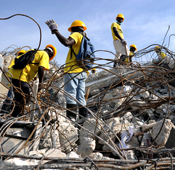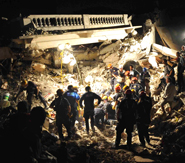AS/COA Online - Haiti Uneasy after Electoral Outcome
/Haiti was dealt another pair of blows this week, between news that a cholera outbreak could likely be traced back to UN peacekeepers and protests over election results. With no candidate winning the requisite majority of the vote, Haitians will choose their next president by casting ballots in a January 16 runoff. But some voters aren’t happy with the results from the November 28 election, which was tainted by fraud allegations; governing party candidate Jude Celestín edged out pop star Michel “Sweet Micky” Martelly by less than a percentage point and will face former first lady Mirlande Manigat in the second round. The ruling party felt protesters’ wrath on Wednesday when its headquarters were set on fire. The December 7 election results coincided with news that a report leaked to the Associated Press linked UN peacekeepers from Nepal to a cholera outbreak that has, thus far, claimed 2,000 lives in Haiti.



